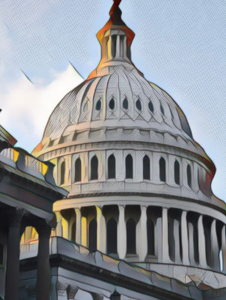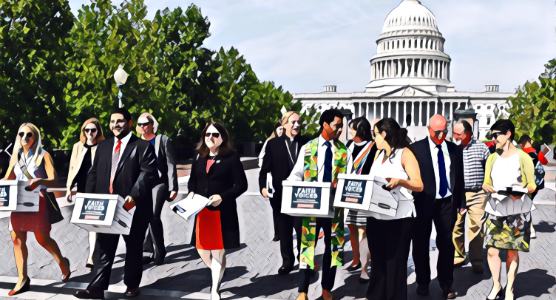A National School Voucher Program is in the Budget Bill Signed Into Law
“By creating a national school voucher scheme, Congress has opened the door for taxpayer dollars to fund private religious education—undermining both public schools and religious freedom,” said BJC Executive Director Amanda Tyler in a statement on July 4. “Families and faith communities—not the federal government—should guide religious formation.”
BJC stood with dozens of national faith partners in opposing this bill, not just because it attacks religious freedom, but because it slashes funding for critical programs like Medicaid and SNAP to bankroll tax cuts for the wealthy, while adding trillions to the national debt.
“On a day meant to celebrate liberty, this legislation erodes it. We will keep fighting for religious freedom for all and the public good,” Tyler said.

The Budget Reconciliation Bil — also known as the Big, Beautiful Bill — passed the Senate with a 51-50 vote on July 1, and it passed the House on July 3.
It retains a modified version of the National School Voucher Program in which states can opt into the program.
- It delivers trillions in tax cuts—primarily for the wealthy.
- It offsets those costs by cutting health care and nutrition programs.
- Even with those cuts, according to the Congressional Budget Office, it would add nearly $3.5 trillion to the deficit over the next decade.
Background:
On June 27, the Senate Parliamentarian ruled that the national school voucher program — which was included in the House version of the budget reconciliation bill — violates the Byrd Rule and must be removed from the bill. However, a diluted version was added back in before the Senate vote on July 1.
On May 22, the House of Representatives narrowly passed its version of the budget reconciliation bill, President Trump’s “big, beautiful bill” that really is a big, bad betrayal of religious freedom in order to provide tax cuts for the wealthy.
BJC hosted a webinar in June with more details on this and other dangers in the budget reconciliation bill, which you can watch here.
When this bill went to the Senate, BJC provided three ways to take action.
Step 1: Tell your Senators to reject the national school voucher program
Creating a national school voucher program would shift taxpayer dollars into private and religious schools through a massive $20 billion tax credit scheme. The budget bill creates this voucher program by creating a tax shelter for the wealthy, under the guise of donations to families likely already sending their kids to private schools. Meanwhile, the bill pays for this and other tax cuts for the wealthy by cutting programs providing public education, health care, nutrition, clean energy, and more. BJC provided a simple form to use to conatct your Senator about the problems with the proposal.
Step 2: Engage your senators in person
As senators returned to their home states after the bill was passed by the House, we encouraged supporters of faith freedom for all to attend local town halls and share their perspective in person.
What do you do at a town hall? Come prepared to talk about issues that matter to you, including the harm that a national school voucher proposal would do to you and your community. It’s particularly helpful when people of faith talk about the dangers of school vouchers to religious freedom for everyone. Scroll down for a section on this page with more information on the issues created by school voucher programs.
Step 3: Share your story
We also created a video and audio collection to lift up the voices of those affected.
What’s the problem with school vouhcers?
School voucher programs – sometimes called “school choice” programs – seek to divert taxpayer money from public schools (which serve all students) to private schools, including private religious schools. People have the right to send their children to private religious schools if they choose that education for their family, but having the government fund religious education undermines our country’s commitment to religious freedom for all. Taxpayers – who are people of many different faiths and people of no faith – should not have to fund religious indoctrination, which is often part of the education in private, religious schools.
It’s not the role of the government to develop students in matters of faith and religious practice, but it is, however, a primary function of the state to provide education for all its citizens. And, government funding of religious institutions can harm those institutions themselves.
In the United States, public education is compulsory, so public schools must take everyone. Private schools don’t have the same rules or oversight as a government-run or public school. They do not have to take all students, and they are often religious in nature, which means that taxpayer dollars are, in essence, funding religious instruction.
A “school voucher” can come in a number of vehicles, including a type of scholarship, a tuition tax credit, education savings account, or a portability plan. In this budget reconciliation bill, it’s referred to as a tax credit for contributions of individuals to scholarship granting organizations.
The first 16 words of the First Amendment say “Congress shall make no law respecting an establishment of religion, or prohibiting the free exercise thereof.” Having the government endorse or fund religion would seem to violate the prohibition on government establishment of religion. Many supporters of taxpayer funding for religious schools through vouchers do so as a way to get around that constitutional barrier of government funding of religious exercise.
Many people who want religious education want it for religious purposes, but some of those purposes are inconsistent with public school purposes of equality and the teaching of secular subjects. And, we expect the government to set requirements and certain expectations for education in public schools, but we do not expect the government to do that in religious institutions or with regard to religion. So if the government gets involved in funding of religious institutions, we can expect the government to have certain expectations and accountability standards that would necessarily change a religious institution.
The language of “school choice” is not new. It was used after Brown v. Board of Education to subsidize parents who wanted to remove their children from the desegregating schools, and the language was also repeated by libertarians, such as Milton Friedman, whose real end goal was privatizing education altogether. But, as voters have proved over and over again – including in the 2024 election – vouchers continue to be unpopular with the greater public, even as they continue to be proposed by lawmakers.
Additional resources
Looking for more on this topic or items to share on social media? Check out the following:
Short video of Amanda Tyler on the problematic school voucher proposal: Available as an Instagram Reel or YouTube Short
Podcast: Amanda and Holly discuss the budget reconciliation bill starting at 8:23 of a special live podcast released on May 27, 2025
Article from NPR: 9 things to know about the big, private-school voucher plan in Republicans’ tax bill









